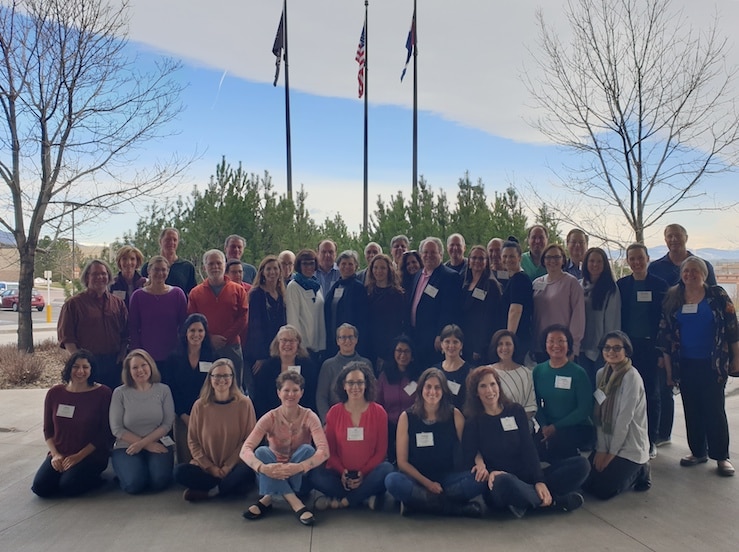Conference Shines a Light on Mast Cell Activation Syndrome and Comorbidities

Doctors Sunny Raleigh and Tamara Kurmanalieva recently returned from a conference in Colorado focused on Mast Cell Activation Syndrome (MCAS) and related conditions, originally organized by Larry Afrin, MD (Armonk Integrative Medicine, Armonk, New York) and Mark Renneker, MD (Univ. of California San Francisco) as a meeting of the minds. A select group of doctors and other health practitioners first met to discuss MCAS in February of last year (2018). This year’s event — the 2nd Annual Workshop on Mast Cell Activation Syndrome and Comorbidities — was held April 11-14, 2019, at the Renaissance Flatirons Hotel in Broomfield, Colo.
Mast cell activation syndrome (MCAS) is a condition characterized by recurring symptoms such as hives, swelling, low blood pressure, difficulty breathing, and diarrhea, all due to the episodic release of abnormally high levels of mast cell mediators. Symptoms of MCAS include the following:
- Circulatory symptoms: Tachycardia (rapid pulse), hypotension (low blood pressure), and syncope (passing out)
- Skin symptoms: Urticaria (hives), pruritus (itching), angioedema (swelling), and flushing
- Respiratory symptoms: Wheezing, shortness of breath, and throat swelling (and even anaphylaxis)
- Gastrointestinal symptoms: Diarrhea, nausea, vomiting, abdominal cramps and pain
Dr. Raleigh became interested in MCAS after being given the book Never Bet Against Occam: Mast Cell Activation Disease and the Modern Epidemics of Chronic Illness and Medical Complexity, and then connected with Dr. Afrin one-on-one, who invited her to the first MCAS and Comorbidities conference. It was then when she realized that she MCAS needed be an area of practice (for diagnosing and treating patients) here at Restoration Healthcare. The realization was reminiscent of how she felt upon learning about Lyme disease after practicing in Maine for several years.
Discoveries like these remove blind spots in medical practices worldwide, as soon as doctors become aware of the research, which is what drives our doctors and staff to keep up on the latest medical research. Since the first MCAS workshop, Dr. Raleigh has done her part to spread the word about MCAS by organizing a MCAS lecture, featuring Dr. Afrin, for the Functional Forum of Orange County.
The Pentad Super-Syndrome
A fascinating part of the recent MCAS gathering in Colorado included a presentation by Dr. Andrew Maxwell of Heart of the Valley Pediatric Cardiology in Pleasanton, Calif., on the Pentad Super-Syndrome — a model revealing that a significant amount of chronic illness can be traced to the following five syndromes:
- Mast cell activation syndrome (MCAS): Leaky gut, endometriosis, dysfunctional uterine bleeding
- Hypermotility type Ehlers-Danlos syndrome (hEDS): Cerebroptosis-Chiari, tethered cord, chronic cervical instability (CCI), cerebrospinal fluid (CSF) leak, visceroptosis, median arcuate ligament syndrome (MALS)
- Gastroparesis:A condition in which the stomach cannot empty itself of food normally, which may be related to small intestinal bacteria overgrowth (SIBO), MALS
- Autoimmune (AI) disease: Sjogren’s syndrome, lupus, pediatric acute-onset neuropsychiatric syndrome (PANS), and pediatric autoimmune neuropsychiatric disorders associated with streptococcus (PANDAS)
- Dysautomia: Polycystic ovarian syndrome (PCOS), menstrual irregularity, chronic fatigue
Further Learning
Another valuable part of the workshop was that it provided opportunities to network with other physicians across the country who are working on some of the most difficult medical cases. Doctor Raleigh was able to meet with these physicians over breaks, learn about their practices, and reap their collective clinical wisdom.
What Dr. Raleigh learned also piqued her curiosity about MCAS and related syndromes, leading them to conduct additional research on their own. For example, they learned that cerebrospinal fluid (CSF) leaks can cause chronic headaches, which feel worse when sitting upright and better when lying down. Additional research led to videotaped lectures from the 2nd Annual Intracranial Hypotension Symposium affiliated with the CSF Leak Program at Cedars-Sinai. That led to the Cedars-Sinai CSF Leak Clinic website, which provided information about other symptoms of CSF leaks, including nausea and vomiting, neck pain and stiffness, changes in hearing, and photo- and phonophobia — extreme sensitivity to light and sounds, respectively.
All of this accumulated learning then flows back to Restoration Healthcare, to the benefit of our patients and the community we serve.
Our Commitment
The learning we gleaned from the recent MCAS and Comorbidities conference is a demonstration of our commitment to our core values, one of which is wisdom:
Wisdom: We are guided by both internal and external forces that stretch our thinking, drive our need to understand, compel us to share what we’ve learned, and propel us to seek professional development and the leadership of others.
Ultimately, our commitment is to restore optimal health to our patients, but wisdom plays a key role in our ability to fulfill that commitment. Doctors cannot find what they don’t look for. Knowing about Lyme disease, Mast Cell Activation Syndrome, Environmental Activation Illness (EAI), CSF leaks, and other illnesses that have been discovered only relatively recently enables us to add that information to our ever-expanding body of knowledge and expertise, so we can more effectively diagnose and treat our patients.
We welcome you to join us on our journey of learning about health and applying what we learn to restoring optimal health and fitness to ourselves, our patients, and our loved ones.

